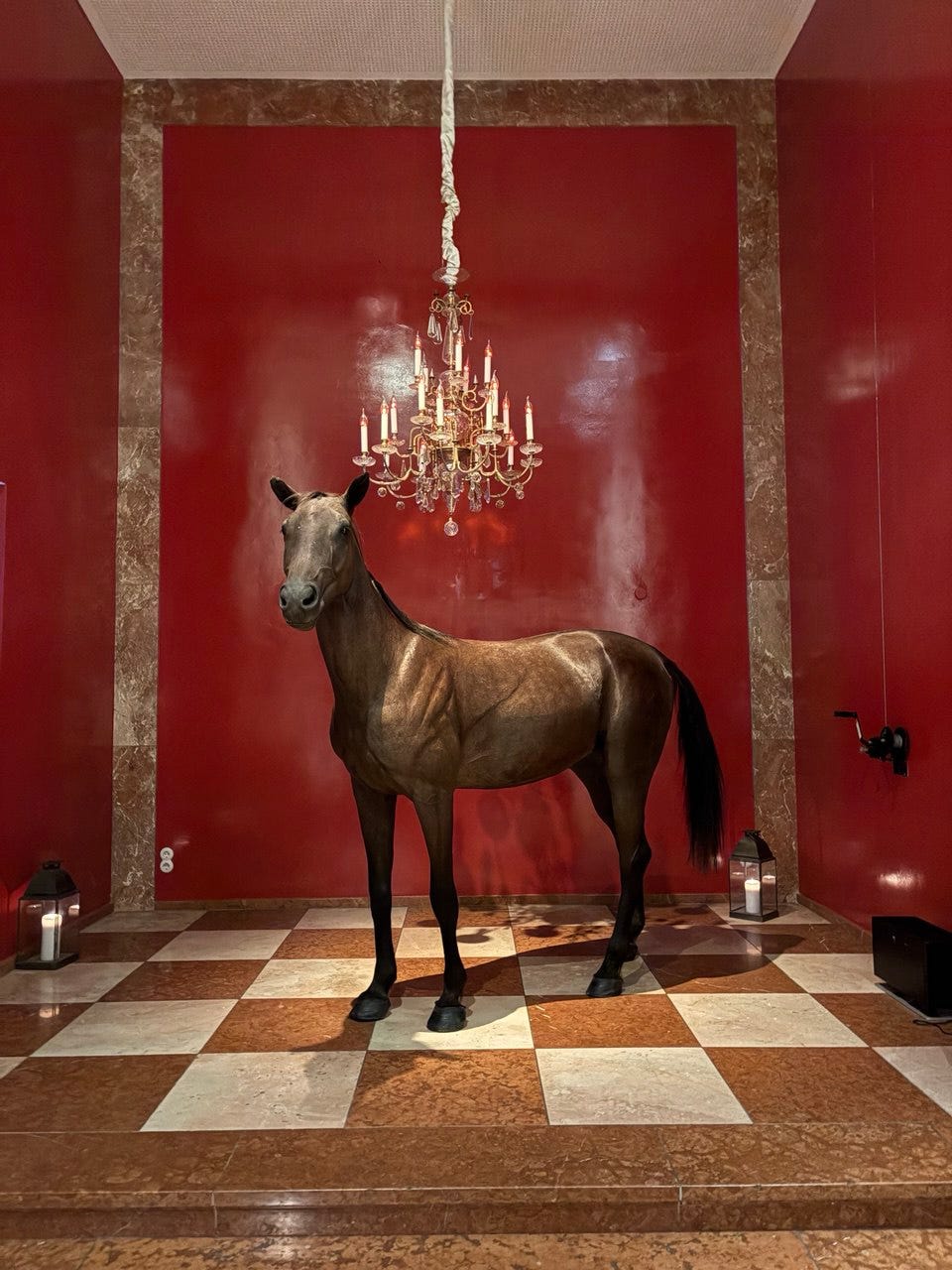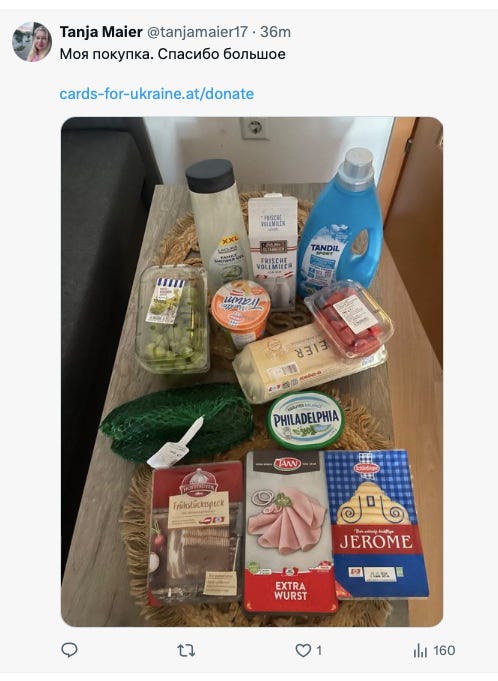A curious phase
Not a lot new to report from Vienna, as we wait to hear who will form the new government coalition. Instead, I recommend several long reads from experts on Ukraine and other topics.
Although we have been surrounded by storms (thinking of the horrific flooding in North Carolina and Bosnia, respectively), it feels like politically this is the quiet phase, as the world waits to see what will happen in the U.S. in November, and here in little Austria, we wait to see who will form the next government, after no single party won more than 50% of the vote. The war in the Middle East has expanded, surely this also intentionally coincides with the last days of the Biden presidency, with all parties understanding that Washington is not going to make any major decisions until after the inauguration of a new president next January. Washington doesn’t even seem capable at the moment of delivering efficient aid to its own people stranded in the hard-to-reach areas of western NC.
If you were to ask me about the war in Ukraine, I could tell you a lot of individual stories I have encountered here in Austria, but at the moment I could not give you a proper overview. I will therefore recommend several long-reads with perspectives on the war and also developments in Russia, from experts who have what I lack at the moment: focus and concentration. Here in Austria, life moves on, and I am contacted on a daily basis with a lot of individual problems, some trivial, some not. The thing with humanity is that we go on living, no matter what the circumstances. A mother of two wrote me a few days ago, explaining she just had a baby and needs help to buy groceries. I do not ask the burning question, why she just had a baby when she can barely feed the first one, but it sits in the back of my mind. I suggest applying for the maternity leave payments for all new mothers in Austria. She says she will do that, but cannot until the baby’s “blue card” (official ID as a Ukrainian in Austria) arrives. In the meantime, she needs help. And I don’t have any cards to send her. But then I remember how much an abortion costs here (€560 in a Vienna clinic that is easy for all to access), and I understand that this might have been an impossible sum for her to access.
I received notes recently that some of you continue to donate to Cards for Ukraine, and we are so grateful for your support. Another supporter wrote me today she has continued to support a cancer patient every month with €100 of grocery aid, and the patient is now fully in remission. These stories are so inspiring because when so many of us “volunteers” experience burn out and begin to feel numb, there are caring individuals carrying the torch, one person to another. And then a photo pops into my inbox, someone has been shopping yesterday, and it warms my heart to know that we still somehow are able to help in a small way, even though it does not come anywhere close to meeting demand.
I am regularly quite harsh in my communications to the Ukrainians in my Telegram group. I remind them on a regular basis that no one is coming to save them. I see over and over again that the most successful people are those who understood this from day one and have worked very hard to build something for themselves here, to try and achieve some kind of financial independence, despite the language and cultural barriers, despite children and elderly parents. Those who keep waiting for the government here to do more will only be more disappointed as time goes on.
For my part, I have toyed with the idea of some kind of autumnal fundraiser, maybe around Thanksgiving, but I just don’t have the energy at the moment, or the vision, to dive into organising something. Perhaps I will be inspired by something more manageable, more simple. It would be nice to bring together people, that is always a really fulfilling part of the process, I’m just hesitant to take on more than I can chew individually at the moment. So we will see.
Several long read Substacks to recommend to you today by experts who have far more insight on these topics than I can share with you at the moment. Again, in no particular order.
On Russia (the subtitle is incorrect; the article is in English). I think these perspectives are so important particularly now that there is so little travel between the west and Russia at the moment. I recently hung out with a friend of a friend who was visiting from Moscow, and what was once just a short flight is now a whole trip via Istanbul. She describes a city that itself has changed a lot, devoid of men, even more so than it once was. But booming in its own way. Another cosmopolitan friend who worked for western companies in Russia wrote me recently of how she spent 10 days in France, and is so sad that this is our reality in 2024. And yet she and her family stay. These are choices everyone has to make on their own and I would never judge. As a mother of sons, this has to be particularly hard for her.
The Russian “opposition” in exile has been embroiled in its own self-created drama of late. I haven’t had the energy nor interest to follow it. I find them all totally irrelevant at this point. But if you are curious for more, read here:
The BBC Russian Service in English on the cost of Vuhledar, yet another Ukrainian town Russia has nearly burnt to the ground in the process of taking. The journalists try to measure Russia’s war dead. I can’t read statistics, but what I do think about are stories. I heard recently from a woman originally from a part of Zaporizhzhia region whose town was occupied by the Russians. Someone got word to them that her sister was “pro-Ukrainian”. They came to her house and held a gun to her temple while they ransacked her belongings, looking for who knows what evidence of her political beliefs. The woman telling me the story is in her 60s, here with her daughter and granddaughter, now starting over from scratch, having buried her husband back home before the war broke out. She described a peaceful, happy life in which they didn’t have the bright lights of the big city but had friendship and joy. She looks back at those decades of peace in awe. She has relatives in Russia who have since turned on her, having eating up the propaganda with giant spoons. She is shocked and sad. I sit and listen, not quite knowing what to say. I think the listening is therapeutic in its own way. That these voices know they are heard. With sympathy.
This article is unfortunately behind a WSJ paywall, but the X thread does have the broad strokes. It asks the question if Europe is now ungovernable, which feels like a very real observation. I watch what is unfolding now here in Austria, as the far right won nearly 30% of the vote, and yet there have been major protests already organised by various groups on the political left arguing that they should not be allowed to form a government. I naively believe that you cannot strip the voice away from the people who have expressed their will just because you do not like the result. Austria’s federal president is treading carefully, having invited the FPÖ leader to enter into talks about building a coalition. The president will also meet these week with the leaders of the other parties. Many believe a three-way coalition excluding the FPÖ may be successful, but I would still put my money on the ÖVP going back on its pre-election promises and making a deal with the FPÖ. I think there is too much animosity between the ÖVP and SPÖ not to mention almost no overlap on policy views for a three-way alliance to hold. But I am no expert.
An Austrian explained to me that in 1999, the SPÖ actually won, and then the ÖVP and FPÖ went behind their back and formed a government as second and third place finishers, respectively. So there is a historical precedent, and yes it was, I was told, met with huge protests from SPÖ voters. I fear real political violence if the FPÖ is not represented, particularly given their access to their electorate via social media. Another issue is of course that they lack a backbench, they have little depth when it comes to professional politicians who could legitimately work on policy. And I would worry about the damage an FPÖ-led government could do to democracy, so it becomes a chicken and egg question, do you let democracy become unravelled through the legitimate ballot box?
As the WSJ article mentions, little countries run by little autocrats like Orban and Vucic start to look all the more appealing when you see how Europe is paralysed in a policy-making sense with no consensus in the middle. The far left and far right are vocal, and many “normal” voters are cynical. I talked with a friend yesterday who could not be bothered to go vote, and although this will horrify many, it is her choice. That too is democracy.
The New York Times did a video report from Ukraine about families with children with cancer. These are the tragic stories so often overlooked by journalism focused on the war itself. Sonya’s story is here.
An uplifting story on dog ownership in Ukraine here. I live in Vienna close to many Ukrainians, and I can attest that the “handbag” dog to owner ratio is very high in our area. The little fluffballs are extremely popular.
I have read bits and pieces about Ukraine planning to announce a "Victory Plan” in the coming days. I struggle to understand what this could mean. As I understand from other reports recently, Ukraine can really only ever be secure once it at some point joins NATO; the alternative is to remain a forever buffer between the west and Russia. Russia shows no signs of wanting to stop the war anytime soon. The west isn’t ready to accept a Ukraine at war into NATO. When you consume the news here in Europe, it is almost as if the war in Ukraine is accepted as just the way it is, like you get used to the idea that a storm is coming and there will be three days of rain. It still feels very far away.
I hope in the coming weeks I will have more insights. At the moment, I am struggling to see where this all goes.







